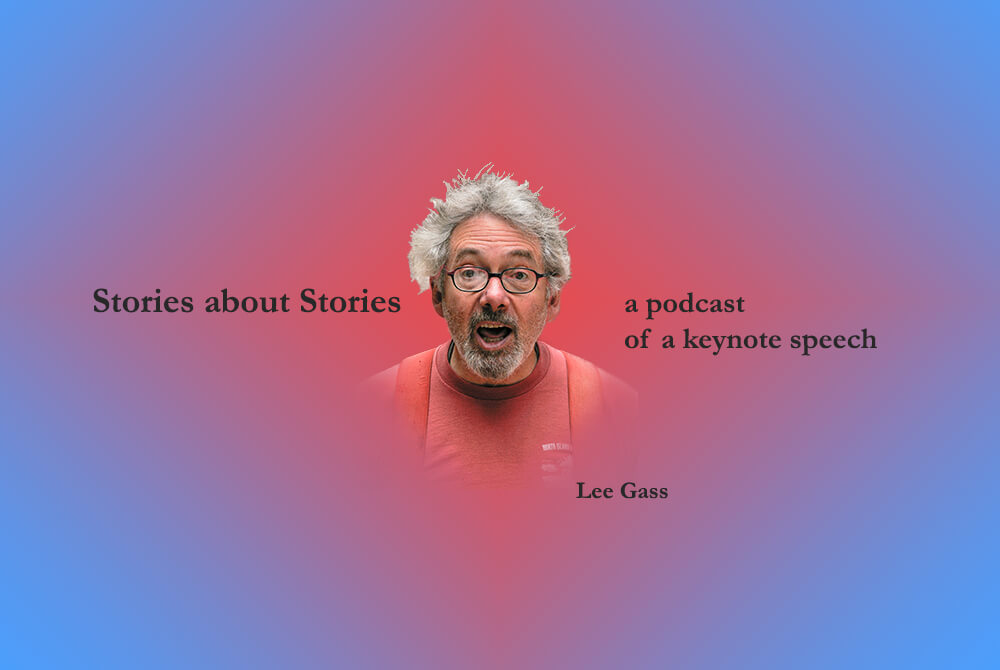Lee Gass
doing what he’s
been doing for about 75
years: telling a story. Photo
by David Shackleton.
STORIES ABOUT STORIES
After winning
national university teaching
awards in 1999 and 2002, I did an increasing
amount of speaking about education. At home I was
an invited guest speaker in education courses, where
I usually knew next to nothing, and a facilitator
of discussions in several schools, faculties, and
departments on defining and achieving
educational objectives.
At other institutions
and education conferences, I was
usually invited to speak on particular topics:
teaching for creativity, real-time team teaching,
interdisciplinary education, deep engagement
among students. Conferences often
have themes and sometimes
they asked me to talk
about them.
Almost always,
I knew well in advance what
I would speak about, which is normal,
makes sense, and if nothing else, helps speakers
think about what they’ll say before they say it and
plan, even if just a little bit. But Tim Pychyl threw me
for a loop in inviting me to give a keynote speech at
a national higher education conference. He didn’t
ask me to talk about anything in particular!
He even said they didn’t want me to talk
about anything in particular, and
didn’t care at all what I
talked about.
Some organizers
had heard me tell stories before
and wanted more. Tim was very clear that
what they wanted was stories, but that was
so broad and undefined that it gave me
only the tiniest glimmer of an ink-
ling of what I could talk
about.
Here’s what
happened. All they wanted
was stories, and they didn’t care what
they were about. ‘What a horrible predicament!’,
I thought, still on the phone, Tim still waiting on my
response. I wondered which of the thousands of stories
I could tell about teaching and learning should I tell, and
how? “Can they be stories about stories?” I asked,
and Tim said they could be anything as long
as they were stories.
So I gave him the title. But I
didn’t know what to say until I heard
myself saying it in Ontario.
Then I knew.
What saved
me from melting down
were my terms of reference. Each
story must be a story about stories. Maybe
I could use stories to show how stories work in
learning and living, or how they’ve worked in mine,
which left lots of stories to sort but at least I could
imagine it. As I confessed in my introduction,
all I knew when I started talking, and
all I really needed to know, was
what story to tell first.
Preparing for Stories
about Stories was hell. It was
unclear how even to begin. The idea
was to weave a big long story that
would be both about stories and
composed of them.
Stories are
usually about something. Some
stories, like allegorical stories or stories that
trap listeners into thinking in particular ways, are
not really about what they’re about, but something that
lies beyond. Stories About Stories: What would my
stories be about? How could I weave them
together? What would my talk
really be about?
Catastrophic Fantasies
I would make a fool
of myself, waste the sponsor’s money,
embarrass Tim and the organizers, set the
conference program back, or freeze and tell no
stories at all. I’d tell motley collections of stories with
no clear relationship to each other and little meaning
for listeners. They’d be in bad taste, be told
with bad timing, and dispirit teachers
and teaching support people from
thinking seriously about
their work.
Those fantasies visited
me repeatedly the night before
the talk, along with many of their relatives.
It was a horrible time of anticipation and a gathering
of fear in my throat and the pit of my stomach. That’s
about all I can say about preparing for Stories
about Stories. Give it a listen. I think it’s
one of the most effective talks
I’ve ever given.
Stories about Stories
My description
of the feeling of what preparing
for Stories was like is close to the bone
of Gendlin’s Experiential Focusing on
bodily felt sense of meaning, which
is central to my approach to
education.
Edited June 2022


